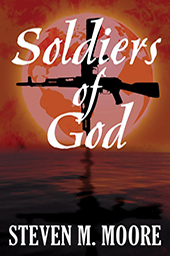Word count…
Some writers are super-conscientious about counting words. Maybe they’re ex-journalists—the editor says, “I want a nine-hundred-word story about the mayor’s birthday party”—or they’re submitting to a ‘zine—“We want short stories, three-thousand word limit.” Whatever the motivation, don’t worry about word count upfront. The right fixation should be making the words count!
Your story determines the words that are needed; how many there are is secondary. A short story can have as much impact as a novel, and a 130k-word novel might be better received as two novels. Write the story that you need to write, and worry about the word count later. And make sure those words are the right words. As much as possible, make them flow for the reader in such a way that s/he cannot imagine any other possible words to use in that story.
I learned this the hard way for “The Chaos Chronicles Trilogy” (now in an ebook bundle—lots of words in that e-file!). I didn’t cause my first problem: an agent said the MS was too long, and there was too much narrative. The narrative she was referring to was world-building; she didn’t know anything about writing sci-fi obviously. World-building is essential. It’s what often makes sci-fi novels longer than mystery or thriller novels. Only fantasy writing requires as much world-building.
But I receive comments and try to reap some benefit from them. Too long? I thought. Maybe. Maybe I should turn the MS into something like the Foundation trilogy? Segue to the second problem: I’m not Dr. Asimov. Yes, I’m an ex-scientist who likes to write sci-fi, but I’m a lot more theme-oriented than the great master, and I cut my sci-fi teeth on dystopian and post-apocalyptic novels.
That MS became two and led to the first two books in the trilogy: Survivors of the Chaos and Sing a Zamba Galactica, with a few excisions and additions along the way. I’d probably still piss off that agent—now there’s even more hard science narrative, with starships jumping through multiverses instead of Asimov’s jumps; ETs whose language is spread-spectrum-based like your cellphone; strange collective intelligences; and so forth. Dr. Asimov, who had no ETs in his Foundation stories (End of Eternity “explains” how that happened), probably wouldn’t like my trilogy at all, especially because at first it wasn’t a trilogy.
The next problem: After all that, how do I make a third book to complete the trilogy? I’ve already pissed off Dr. Asimov’s ghost, so I decided I needed someone like his Mule. Having just come through the 2007-2009 recession, which led to my mystery/thriller novel The Midas Bomb, I decided my Mule would be a mad shipping magnate. That made the trilogy come full circle—starting with the dystopian Earth of Survivors of the Chaos, where multinationals had run amok, and ending with my version of the Mule, who upsets peace and prosperity, just like Asimov’s Mule did, an outlier no one can predict, not even that strange, collective intelligence called Swarm.
Some have called Come Dance a Cumbia…with Stars in Your Hand! military sci-fi. Yes, there are battles, but none more important than the battles between Humans and Tali in Sing a Zamba Galactica where Humans fight to regain control of Earth. My Mule, the psychotic shipping magnate, is an amalgam of many evil autocrats, from the corporate boardrooms to the Kremlin and White House (I’m actually channeling Gabo’s dictator in Autumn of the Patriarch to some extent, another amalgam). Greed and power drives the Tali; it drives some Humans even more.
So the third book just rounds out the series and establishes ITUIP (the International Trade Union of Independent Planets), which appears in many of my sci-fi stories. But these books aren’t Asimov’s, and I really didn’t worry about word count. I only worried about finishing a saga that I’d started with that agent who had no clue about how to write sci-fi. Narrative aka world-building is important; the number of words the sci-fi writer, or any writer, uses to make that narrative isn’t. Use the words you need to use, no more, no less. The Goldilocks Principle applies.
***

Comments are always welcome.
Soldiers of God. An FBI agent and priest collaborate to thwart a group of domestic religious terrorists in the US and uncover an even larger worldwide conspiracy created by an international villain who uses extremists to further his own agenda. This novel is an important bridge between the “Clones and Mutants Trilogy” and the “Chaos Chronicles Trilogy.” The villain has been causing trouble since The Midas Bomb. Available in ebook format from Amazon and Smashwords and the latter’s affiliated retailers (iBooks, B&N, Kobo, etc.) and lenders (Overdrive, etc.)
Note: To understand all the connections between several of my series, download the free PDF “Future History Timeline”—see the web page “Free Stuff & Contests.”
Around the world and to the stars! In libris libertas!

October 8th, 2019 at 4:13 am
Hi Steven,
First, congrats on the new novel! Length is a problem. Publishers will reject books they consider too short or too long. I agree it should be the author who makes the decision. However, if writers want to be published traditionally, they have to follow guidelines.